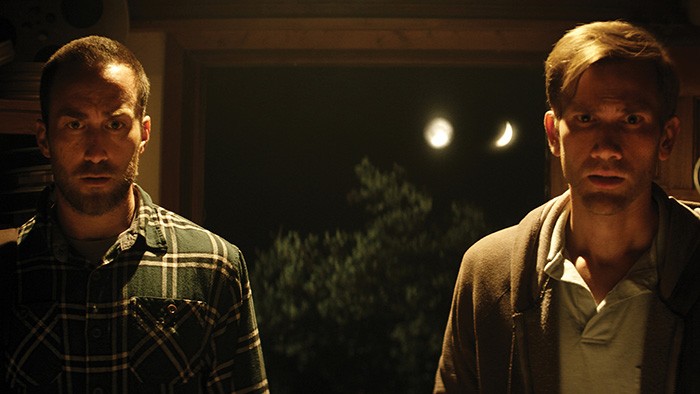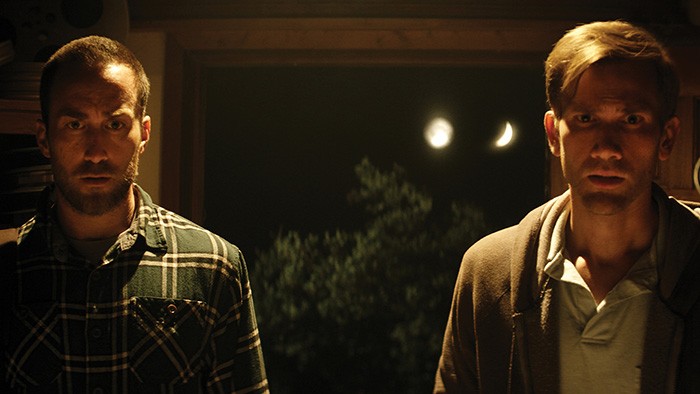
As someone who loved Aaron Moorhead and Justin Benson‘s Spring to the point of seeking out everything else they had done before that point, hearing about a new work debuting at Tribeca got me excited to see what they would deliver. My assumption was that it was the Aleister Crowley picture they spoke about when I interviewed them last year — I was wrong. While that discovery wasn’t surprising considering how long projects gestate, it was shocking to discover The Endless proved to be a sequel to their first feature collaboration Resolution.
They have created a film around the characters they played themselves: Aaron and Justin, UFO cult members. Would this new tale ten years later be only tangentially related through these characters or would the mythos be the same? If the latter, would it bring back the “monster,” locale, and supporting cast? These are important questions to ask, but not necessarily seek out answers until watching it. As Resolution and Spring have both shown, Moorhead and Benson always have a few tricks up their sleeves to freshen up genre conventions and provide intelligently and emotive mysteries to excel beyond them. The Endless is no different.
In an attempt to avoid spoilers our conversation with the duo mostly focuses on their craft: what it was like developing the story, directing themselves as leads, and any hopes for the future as they look to secure distribution [Well Go USA has since bought the rights for a 2018 release]. They provide us an update on that Crowley project too.
The Film Stage: Not to start this off with a weird question, but I did notice your “international collector” Jesse Summoner [an online character created during the build-up to Resolution] being thanked in the end credits. Was that just an Easter egg or perhaps a hint towards a new viral social media campaign on the horizon?
Justin Benson: Oh man. Thank you for the idea. We’ll pass that along to the future distributor — whoever that ends up being.
Aaron Moorhead: It’s brilliant.
JB: But it is. It is a very intentional Easter egg and it’s very inside and very impressive you caught that.
AM: You know what’s funny is I remember checking the credits during one of our last three screenings and being like, “Did we put Jesse in there?” We normally do and I couldn’t find it because I was distracted with something else. But I’m glad that he is in.
I actually watched Resolution after Spring at home, so I was able to pause it on the screen stating where the “footage” originated. A Google search later and I’m reading through all the WordPress posts. It was definitely a nice little added bonus.
JB: Awesome.
What was it like finding out that the festival [Tribeca] where everything started with Resolution not only selected The Endless but also placed it in competition for US Narrative?
JB: It was a really exciting night. I can imagine someone looking at our careers and being like, “Oh they made a new movie so they’re probably going to premiere it at a big film festival.” The way we feel about it is, “We have a new movie done. Oh my God. What if no one premieres it anywhere and no one ever sees it and we just wasted a year on this.”
So we were overjoyed to the fact that it was kind of home. Obviously we love the festival. It’s launching a movie from arguably — at least one of the most important cities on the planet that operates as like a satellite dish for information. It just kind of explodes out from this spot like a giant satellite. And the competition thing was particularly exciting because … it’s less about the prospect of winning an award and more about just feeling good that someone saw our movie and saw dramatic merit beyond all the sci-fi stuff. We love all that stuff, but it was cool that people would have the expectation that this is going to have an additional dramatic merit.
AM: Also we were told that a genre film doesn’t normally get into the competition of festivals like this so … we were told it was the first genre film let in since Let the Right One In about a decade ago. I’m not sure that’s true because I didn’t check, but we were told that and we’re very, very proud of it. So it felt like in some ways thematically appropriate considering the film is about coming back to the homestead — that we were able to kind of like do something that gave our careers such a big start five years ago, but even bigger this time.
How long has this chapter been gestating? Were its revelations known while writing Resolution or did that evolution begin more recently?
JB: Genuinely, this movie — whether we knew it or not — was in development for about six years. There were a lot of things in Resolution that we just couldn’t stop thinking about. It was a situation where we always knew most people haven’t seen Resolution or will never see Resolution, but it was a world that inspired us to tell a story that we’re really proud of that can exist on its own.
It’s been fun seeing both reactions. It’s been fun seeing people discover certain characters we’ve loved for six or seven years now and love them too. And it’s fun to see people who already loved them revisit these characters. It’s weird. We didn’t know it, but we were developing this movie for six years.
We even did a trial run with a different movie. [laughs]
AM: Yeah, that’s the weird thing. We keep on forgetting to even mention it much less think about it, but there’s about maybe twenty to thirty minutes of a totally different movie with a very broadly similar concept that we were making just on our own while traveling with Spring on like a DSLR camera in different countries. We were playing like really goofy versions of the cult members. That exists. Maybe we’ll piece some of it together for the Blu-Ray or something.
The idea was definitely sticking with us. And then all of that got completely ditched in favor of making this much more cohesive and coherent movie. [laughs]
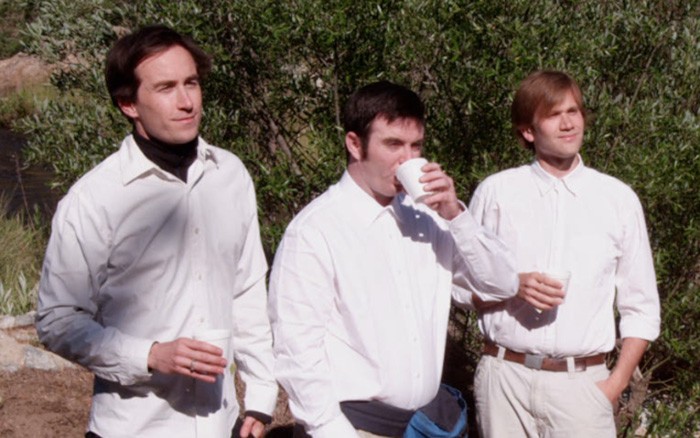
And with that you then put it into the Resolution world and onto characters that you two and [producer] Dave Lawson played. What was the experience like directing yourselves?
JB: You know, every single thing in filmmaking is really, really, really, really hard. Directing ourselves … it wasn’t for the most part more difficult than it’s ever been. Again: everything in filmmaking is hard.
In terms of where your time and energy is going: instead of answering a million little questions for another performer that you have to be able to answer as a director — that’s your job — to work with that performer. Instead, we knew the answers to all those questions. But we were the ones in rehearsal doing it for a month ahead of time. A lot of time and energy goes into that.
It’s not necessarily more difficult, but it’s a reallocation of time and energy and towards our own performances rather than communicating it to someone else.
How was it knowing everything? It’s the kind of movie that some directors may keep their leads in the dark as far as its revelations. You didn’t have that luxury. Or maybe it wouldn’t have been a luxury?
JB: It’s actually a two-part answer. One is … what’s really exciting about a movie like this to us is the mystery. It’s a mystery probably first and foremost. It’s the easiest way to describe it without mashing a bunch of genres together. It is definitely a mystery. When you know all the answers to a mystery, normally it becomes uninteresting. It loses its re-watch value and that kind of thing. Everything about it is: What is the answer to the great big riddle?
But for us this movie somehow was always the kind of movie we’ve been trying to make. It wasn’t exactly like this story or whatever, but it was this kind of movie where it was like: “Oh it’s this cool sci-fi, kind of funny, definitely scary, sort of puzzle box of a movie.” And that’s what we’ve always been trying to do. So we were able to derive a whole lot of excitement out of knowing all of its mysteries. We were able to come for the mystery and adventure and stay for our own interest in the character development.
The second part to it: when you say that you wouldn’t want your lead actors to know things like that? Honestly that isn’t part of our process at all. Even if we didn’t cast ourselves we would have told everyone everything. We find deep understanding to be a more useful tool than keeping people selectively in the dark. But that’s just our process. A lot of other filmmakers do it differently.
Now that you have two films in one franchise — one world — did you create a “bible” to go back to for that character development?
JB: It’s interesting. We don’t have a bible for this world. That’s an interesting idea, though.
AM: That’d be kind of cool.
JB: We have several TV shows in development where we’d typically do something akin to a bible that has a lot of details about the world in it. But to be honest, it’s almost like the bible to this world is The Endless and Resolution. It is the Jesse Summoner chronicles.
AM: The blog website.
JB: It’s the weird UFO cult website.
AM: It’s the first ten minutes of Spring.
JB: It’s like two characters from an early script phase of The Endless. There are scenes that already exist that just didn’t … we swapped them out for something else that communicated a little bit more of what we wanted in this movie.
It’s more fun to come up with your rules by coming up with characters and working around them — what they would do. Letting the rules kind of get identified through that rather than coming up with the rules first. So that’s why the “would-be bible” of this world just seems to work a little bit better in conversations first.
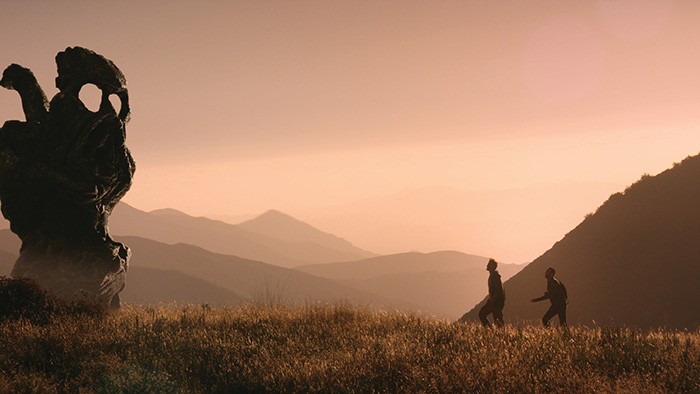
You guys definitely do that with character. The supporting cast is great front-to-back, but I want to single out Lew Temple as Tim because on first watch he’s a mysterious figure, kind of Hal’s [the de facto cult leader] equal but quiet. And then you watch it a second time and you start seeing that stoicism as worry of this kind of paternal figure. There are so many layers to it.
JB: He … Oh man. I hope I can express this in a way that doesn’t sound like hype promotional director talk. But he is fascinating because he asks so many good questions. We’ve had hours of conversations with Lew about his character.
AM: Before he would even sign on.
JB: Before he would sign on it was probably a six-hour discussion and then another six-hour discussion.
AM: By the way, I also want to point out in all of this: I think Lew has three lines in the whole movie and they’re all about beer. [laughs]
JB: So every character in The Endless at the camp who … you know, it’s never said exactly, for example, how old they are, when they entered the camp, or what exactly their backstory is. But everyone has a very elaborate backstory they’re aware of. Aaron and I wrote them out, gave it to them, and then we had a very long discussion. The longest discussions were probably with Lew and it is fascinating to watch him on set internalizing that information and then just execute little things in his performance. It’s truly fascinating.
I actually … I used to think that building a character’s history was kind of like an actor-y film school thing. Not that we’ve not always done it, but I don’t know how much of an impact it actually made. We can answer any question about anything in this world.
But in this movie, watching Lew and watching [Callie Hernandez, who played Anna] and watching Hal [Tate Ellington] and Shane [Shane Brady] — watching these characters who … there’s a lot of them. So they don’t get … the screen time is distributed among them, so they don’t get much. But how much they did with a glance because they had so much information about their characters [is immense].
I’m very proud of our accomplishment of I think people feeling, as they say, a river — this big river of something under all of these people [so audiences] get little hints of these characters’ backgrounds because we did all that exploration. And Lew is probably the one we did the most with. I don’t know. He’s a brilliant guy and it’s fascinating to watch how his mind works.
AM: It’s cool that you were able to single that out because when you do that kind of work, where it just revolves around shots of someone looking with an enigmatic expression on their face — and that’s basically all he gets except for one powerful line, “Don’t do it if you don’t want to” — that’s called doing a whole lot with [very] little. And Lew is a master of it.
You can see that depth in micro-expressions and little lines of dialogue. You want to know what Hal’s physics equation is. You want to know about Anna’s sister who supposedly left — it’s like a throwaway line, but it has so much weight behind it.
AM: Man, you have a good memory.
JB: Thank you for bringing up Anna’s sister. That’s a really interesting one.
And I’ll point out another small detail that Lew brought to it after lots of conversations: the fact that Tim, well Tim’s wardrobe was always intentional. “Oh, you know, he’s going to be dressed basically like how John Muir dressed when he came to explore the west coast of America.” That was kind of the inspiration for that. But Lew came to set wearing this Christian cross, which is really interesting because the movie deals with an esoteric, unknown omniscience. It has nothing to do with Judeo-Christian mythology, but we saw it and loved the idea that Tim still had his own faith. The fact that he seems to be involved in something otherworldly that has nothing to do with that faith. It’s just a small, interesting thing.
AM: I also want to mention how Lew started talking on set with an Irish accent. I couldn’t remember and I was like, “Is he Irish?” I couldn’t remember. And then when he runs through rehearsal he didn’t drop the Irish accent. And so at a certain point we’re like hanging around the camp and he’s just like, “What do you think? Is [Tim] Irish now?” We talked it out a bit and were just like, “I’m going to trust you that that’s a great Irish accent because I think it is, but I’m an American. And I think it makes a whole lot of sense that he’d be Irish especially considering what we talked about with his backstory, but I have to trust that that’s a good accent because I don’t know. You know it sounds great to me.” [laughs]
And luckily we have [received] the thumbs up from Irish people [who have seen it].
I wondered if you could talk about the use of “House of the Rising Sun” throughout the film — thematically and ethereally with Emily Zuzik’s haunting vocals. Not that Aaron’s renditions aren’t also haunting.
AM: It’s haunting in a different way. [laughs]
Yeah, when Justin is writing a script we basically kind of — for this one because it was going to be just a tiny production originally — we were kind of gathering our resources. What seems big but doesn’t cost anything, right? So we’re looking at songs we can use because one of the things that Aaron … Moorhead, in real life — I really like karaoke. Okay, we can add a karaoke scene, that’s fine. We can see how we can integrate that into the camp as like a camp building exercise.
So we’re looking for songs we can use that are in the public domain and “House of the Rising Sun”, the lyrics were actually written like one hundred and fifty years ago or something. What it’s about is a sibling warning their other sibling not to repeat their mistakes. So it’s just like, “Well that’s absolutely perfect.”
So that came into the karaoke scene and then it actually turned into a much bigger deal, especially once Jimmy got on-board. Jimmy is our composer — Jimmy LaValle. He got on-board and he was able to turn it into one of these just massive themes. Even the “House of the Rising Sun” coming from that tent in the movie — that was just supposed to be some old music. And then the credits, we didn’t know what we were going to play.
So yeah, it kind of ended up wrapping around itself just purely by virtue of it being a song that’s in the public domain that happens to reflect the theme of the movie.
JB: The only other song that could have matched the movie tonally in terms of, “Oh, those lyrics are creepy and everyone kind of knows it.” … And actually that the content of the song, depending on how you interpret it, is similar is “Hotel California” by the Eagles. However, if we had used that song we would be speaking to you from jail probably. [laughs]
AM: Either from copyright infringement or bankruptcy. [laughs] One of the two.
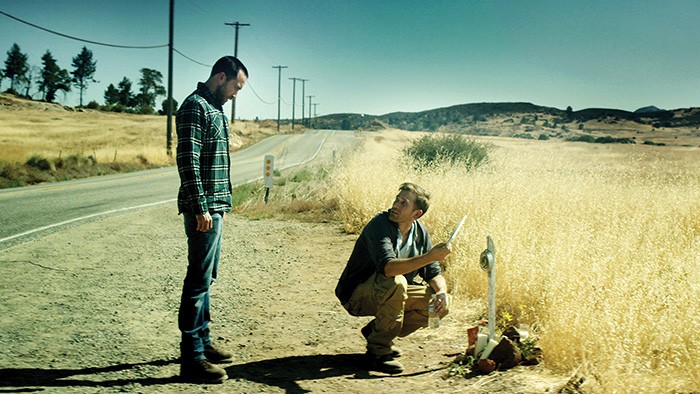
With The Endless being a new release that just premiered without a distributor yet … there’s been a lot of talk about Netflix and streaming opposite independent filmmakers. You guys have seen Tribeca Film and Drafthouse release your films in theaters and now Resolution is on Shudder.com. What are your opinions on that part of the industry? Do you necessarily hope for theatrical above online or are you happy wherever it lands?
JB: They both have their advantages. I don’t think that anyone would argue [against how] in most cases on Netflix, that’s when the most people will see your movie. And no one will argue against the movie theater experience being an extremely romantic spectacle.
And that’s not like a diplomatic cop-out. It’s the truth.
AM: There’s been many weekend recently where the indie, the specialty box office has beaten — you know, per screen averages — traditional box office. So it’s definitely a viable method of making your movie seen and to make money for the distributor.
The good news is, at the end of the day all you really want is for a whole lot of people to see it.
JB: This isn’t even false optimism: it’s becoming a very good time for independent film. I saw a few weeks ago that Trainspotting 2 did amazing in the specialty box office. That was so heart-warming to see. On the one hand it’s, “Well it’s a franchise; it’s a recognizable name.” But on the other, that’s like a very personal movie. It’s cool that people went out to the movie theaters to see it. That’s amazing. It’s really inspiring.
Any update on the Aleister Crowley movie?
JB: Yeah, it’s actually currently now being developed as a TV show. It’s still moving ahead — full speed ahead. And it’s actually just gotten bigger and better, which makes us very happy.
The Endless premiered at the 2017 Tribeca Film Festival and will be released on April 6, 2018.

